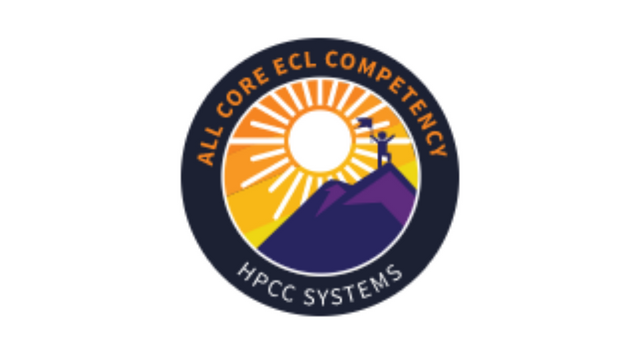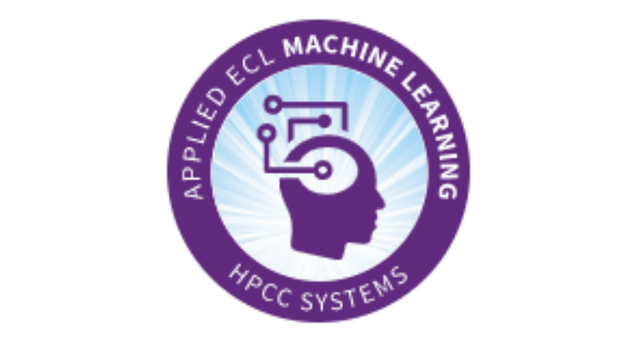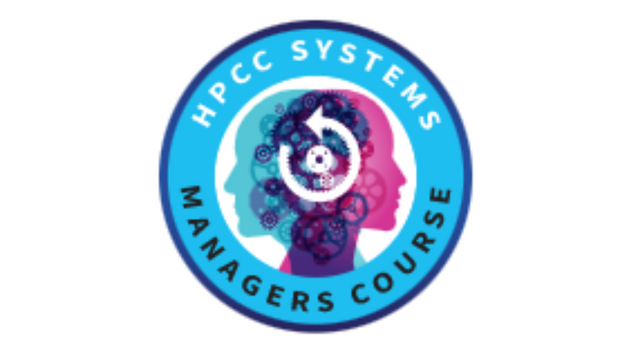Training
PLEASE NOTE: The Learning Center platform for our online courses has been revamped! LexisNexis Risk Solutions and all RELX employees can view the HPCC Systems catalog on The Edge.
For our external community members please visit this page. Sign in or register to access the classes.
Individual classes can also be accessed via the appropriate link within each class description on this page. Please contact the HPCC Systems Training team with any questions.
ECL is a remarkably powerful language for solving big data challenges — as you start learning the language, the ideas will begin to flow.
Our training options are sorted into learning tracks to make it easy to figure out what classes you should take in what order. First, select the learning track that best fits your needs. Once you have identified the courses you need, you can get started right away with our online classes or check the schedule and attend the next remote or in-person instructor led class.
Select Your Learning Track
Introduction to ECL (Part 1): Concepts and Queries
This class is for developers who want to understand HPCC Systems and learn ECL to build powerful data queries. Anyone who needs a basic familiarity with ECL should take this course.
Topics Include:
- HPCC Systems Overview (Thor and Roxie)
- Introduction to ECL Concepts and Syntax
- Using the ECL IDE and ECL Watch programming tools
- Flat and CSV File Sprays
- Defining Files (RECORD/DATASET)
- Record Filtering
- Basic Definition Types – Boolean, Value, Set, Recordset
- Creating Simple ECL Queries
- Managing your ECL Code
- Despraying Files
Introduction to ECL (Part 2): Data Profiling and Transformation
This intermediate level class is for developers who want to extend their knowledge of ECL to profile and transform any data with the HPCC Systems environment. Anyone planning to write and work with ECL code should attend this course.
Topics Include:
- Principles of ETL in ECL
- The TABLE Function (Memory Tables)
- TRANSFORM Functions (PROJECT, etc.)
- Data Hygiene (Cleaning and Standardization)
- Lookup Tables
- OUTPUT to Disk Files
- Simple JOINs
This course is the second in a two-part introductory series.
Advanced ECL (Part 1): Working with Relational Data
This class examines in detail the ECL functions that make it easy to work with relational data in the HPCC Systems platform. ECL began as an extremely powerful query language built around easily querying into relational data. The techniques taught here reveal that power to its fullest.
Topics Include:
- Creating Hierarchical Relational Datasets (Nested Child Datasets)
- Nested Child Dataset Definitions (RECORD/DATASET)
- NORMALIZE and DENORMALIZE
- Complex Multi-level Relational Querying
It is highly recommended that students take the Introduction to ECL (Part 1) – Concepts and Queries and Introduction to ECL (Part 2) – Data Profiling and Transformation training classes before starting this class.
Advanced ECL (Part 2): Super Files, Working with XML, Free-Form Text Parsing, and Machine Learning
This course explores the concept of Super Files in ECL and the techniques for working with XML data, getting it into your HPCC Systems cluster, and defining it to work with other data elements. This flows naturally into the detailed ECL support of Natural Language Parsing – creating pattern-matching definitions and using the PARSE function to extract data from either XML or free-form text.
Topics Include:
- SuperFiles and SuperKeys
- Simple XML Spray and Dataset Definition
- Working with XML Data (simple, complex, and nested)
- Complex XML Spraying and De-spraying
- PARSE with XML Data
- Spraying and defining free-form text data
- PARSE with free-form text
- New! An Introduction to Machine Learning
It is highly recommended that students take the Introduction to ECL (Part 1) – Concepts and Queries and Introduction to ECL (Part 2) – Data Profiling and Transformation training classes before starting this class.
Applied ECL: ECL Code Generation Tools
This class is for developers who want to extend their knowledge of ECL to use the ECL code generation tools to automate operational tasks.
Topics Include:
- Creating and using FUNCTIONMACROs
- Creating and using MACROs
- The ECL Template Language
- Automating ECL
- ECL Scheduling
It is highly recommended that students have completed the Advanced ECL (Part 1) – Working with Relational Data training course before starting this class.
ROXIE ECL (Part 1): Indexes and Queries
This class is for developers who want to extend their knowledge of ECL to developing ROXIE queries for end-user use. In this course you will learn the benefits of payload indexes, as well as use of the indexed joins that make query results fast. Anyone planning to write ECL code to provide final-product data to end-users should attend this course.
Topics Include:
- Defining and Creating INDEXes
- Using FETCH
- Creating ROXIE Queries (STORED)
- Testing Queries in Thor
- Deploying to ROXIE
- Payload Indexes
- Full and Half-Keyed JOINs
- Optimizing Queries (LIMIT, ATMOST, KEEP)
It is highly recommended that students take the Introduction to ECL (Part 1) – Concepts and Queries and Introduction to ECL (Part 2) – Data Profiling and Transformation training classes before starting this class.
ROXIE ECL (Part 2): Complex Query Development
Learn how to optimize and organize your ROXIE queries for optimal performance. This class reviews and recommends best practices used in ROXIE development, including INTERFACE, Half Keyed JOINS, LIMIT, superkeys, and package maps.
Topics Include:
- Using INTERFACE Structures with ROXIE Queries
- Limiting Your ROXIE Results (LIMIT, JOIN, CHOOSEN)
- Designing Queries Using Multiple Datasets
- Case Insensitive Searches
- Use of Superkeys in ROXIE Queries
- Use of Package Maps for Query Organization
- ROXIE-Specific Functions (PRELOAD, ALLNODES, etc.)
- ROXIE Post Filtering
To get the most benefit from this class, it is highly recommended that students take the Advanced ECL (Part 2) – Super files, Working with XML, and Free-form Text Parsing, and the Roxie ECL (Part 1) – Indexes and Queries training classes before starting this class.
Applied ECL: Special Projects
This class helps developers level up their skills from Student ECL Coder to Journeyman ECL Coder through a supervised real-world project.
Topics Include:
- One real-world project proposed by the student(s) and agreed to by the Instructor.
- Mentoring at every step, with guidance from project planning through completion.
- Regularly scheduled remote (Teams/Webex) meetings.
- Code Review
- Progress Evaluation
Class prerequisites: All other ECL Core Classes
Machine Learning with HPCC Systems
This course explores the fundamentals of Machine Learning with ECL, and explores many of the supported open source Machine Learning bundles.
Topics Include:
- Introduction to Machine Learning
- A Learning Tree Tutorial
- Using the Myriad Interface
- Introduction to Deep Learning
- Generalized Neural Network (GNN) Tutorial
- Using the KMeans Bundle
- Using the DBSAN Bundle
It is highly recommended that students have completed the Introduction to ECL (Part 2) – Data Profiling and Transformation training class before starting this class.
Introduction to HPCC Systems for Managers
This class is for anyone who wants to understand the HPCC Systems platform and see how ECL can build powerful data queries. Any manager who needs a basic familiarity with HPCC Systems should take this course.
Topics Include:
- HPCC Systems Overview (Thor and Roxie)
- Introduction to ECL Concepts and Syntax
- Introduction to the ECL IDE and ECL Watch programming tools
- Creating Simple ECL Queries
HPCC Systems Administration
This course is for anyone who wishes to maintain and manage an HPCC Systems Cluster. Lessons focus on the daily operations of an HPCC Systems Administrator, and introduces best practices that have been recommended by members of our in-house LexisNexis RISK Solutions HPCC Systems team.
Topics Include:
- HPCC Systems Architectural Overview
- Routine Maintenance
- HPCC Systems Preflight
- Using the Configuration Manager
- Best Practices and Troubleshooting
No prerequisites are required, but a basic knowledge of Linux and Linux commands are a plus.
Introduction to HPCC Systems Administration: Thor Clusters
This class is for system administrators who will be maintaining Thor environments.
Topics Include:
- HPCC Systems Overview (Thor and ROXIE)
- Introduction to ECL Concepts and Syntax
- Using the ECL IDE and ECL Watch Programming Tools
- Flat and CSV File Sprays
- Defining Files (RECORD/DATASET)
- Configuration and Maintenance of Thor Systems
- Troubleshooting
Instructor-led course length: 3 days
Class prerequisites: None
Informal Thor and ROXIE Administration classes are presented by the LexisNexis Risk Solutions HPCC Systems Operations team in Boca Raton when requested. Please contact us at training@hpccsystems.com for more information.
Advanced HPCC Systems Administration: ROXIE Clusters
This class is for system administrators who will be maintaining ROXIE environments.
Topics Include:
- Configuration of ROXIE Systems
- Maintenance of ROXIE Systems
- Troubleshooting
Instructor-led course length: 2 days
Class prerequisites: Introduction to HPCC Systems Administration: Thor Clusters
Informal Thor and ROXIE Administration classes are presented by the LexisNexis Risk Solutions HPCC Systems Operations team in Boca Raton when requested. Please contact us at training@hpccsystems.com for more information.
Platform Overview Videos
Platform overview recordings have been prepared by our developers to help you get started quickly on a variety of topics. This series is a great place to visit if you don’t have much time and want to find a quick answer about a specific task. We are adding to the list all the time, so keep checking back for new tips and tricks to help you get the most out of using HPCC Systems.

Learn how you can access our training courses for free!

Have questions about training?
Digital badges
Show off your training accomplishments! Once you complete certain training courses, you will be awarded one of these eye catching digital badges to show off to your colleagues and friends. See all the badges

ECL Courses
ECL competency badges for all levels

Machine Learning
Advanced ML analytics and causality

Managers Course
Overview of the HPCC Systems platform

